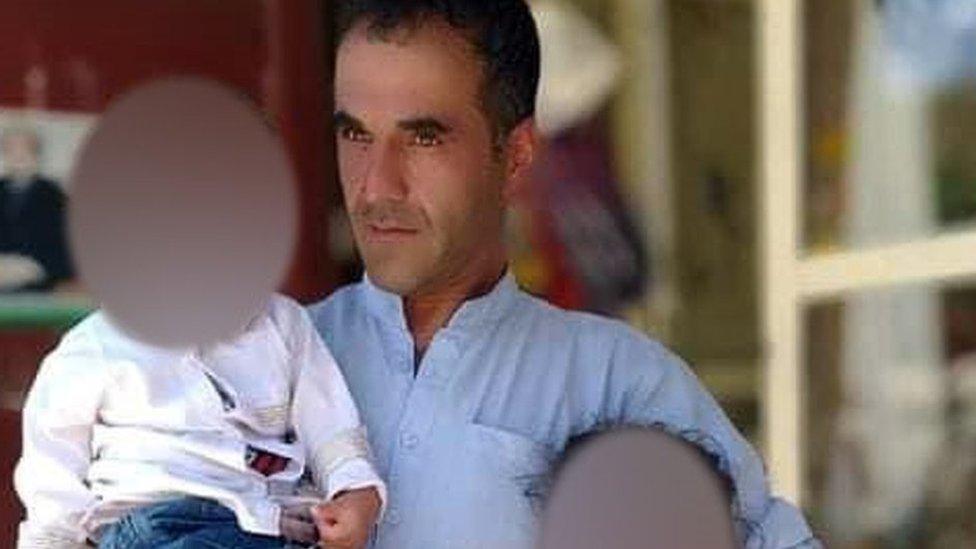Afghanistan: In a quiet valley the Taliban face armed resistance
- Published
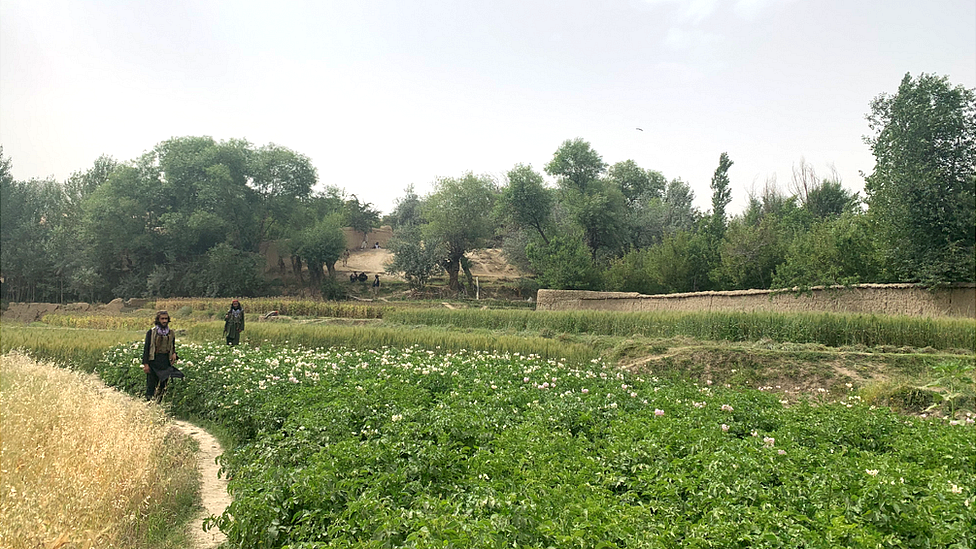
The BBC visited the Andarab area under the watchful eye of Taliban guards
Travelling through the scenic Andarab valley north of Kabul there is no visible sign of conflict.
But whilst the Taliban are more powerful and better armed than ever before, here and in neighbouring province of Panjshir they are facing a nascent armed resistance to their rule in Afghanistan.
Small groups of guerrillas, hidden away on mountain tops, led by soldiers from the former Afghan army, have been launching ambushes and engaging in clashes with the Taliban.
Driving past fertile, green fields, we are accompanied by the Taliban at all times, and under their watchful eye locals praise improved security under their rule and are dismissive of the rebels. Some of the praise does appear genuine, but in the side street of one bazaar, a man tells us darkly: "I can't tell you the truth - if I did, I could be killed."
It is difficult to get a sense of the true scale of the fighting - the resistance forces often exaggerate their strength, whilst the Taliban outright deny their presence. In Panjshir, however, anti-Taliban fighters managed to shoot down a military helicopter and capture those on board.
Elsewhere in Baghlan Province, resistance fighters have recently filmed themselves pulling down a Taliban flag from a military post.
When the BBC travelled to the Andarab valley in June, however, the Taliban appeared in firm control of the territory.
We visit the village of Qais Tarrach and are assured by the local military commander that "there are no problems".
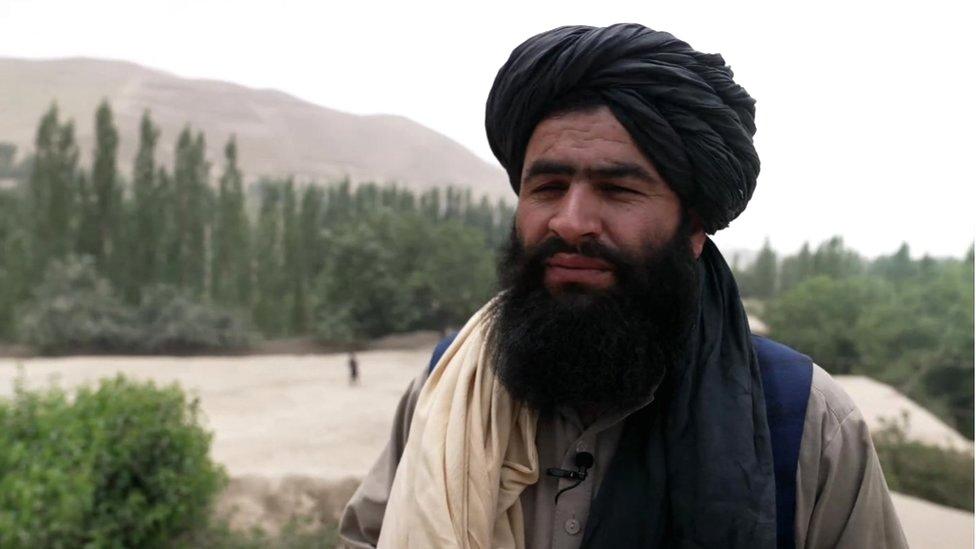
Military commander Qari Jumadin Badri denies the presence of resistance fighters
"You can see for yourself, we only have a very small military presence here," Qari Jumadin Badri, who leads a battalion from the army's Omari Corps, tells me from a hilltop overlooking the valley.
But we have been reliably told of an ambush by resistance forces on a Taliban vehicle close to here in May, in which two Taliban members were killed.
"That was a long time ago," Mr Badri says. "We launched some operations in the mountains and now there is nothing."
In Panjshir videos have emerged of long convoys of Taliban reinforcements, but there too Taliban officials have denied consistent reports of clashes.
Andarab, the other bastion of anti-Taliban sentiment, appears less heavily militarised, but speaking secretly to local residents we have been told of repeated and serious allegations of human rights abuses carried out by the Taliban in trying to stamp out the resistance movement.
A relative of a villager named Abdul Hashim tells us he and three other men were detained and killed by the Taliban immediately after the ambush near Qais Tarrach, after wrongly being accused of involvement in the attack.
"He had his hands tied and was shot in the head and chest," the relative said.
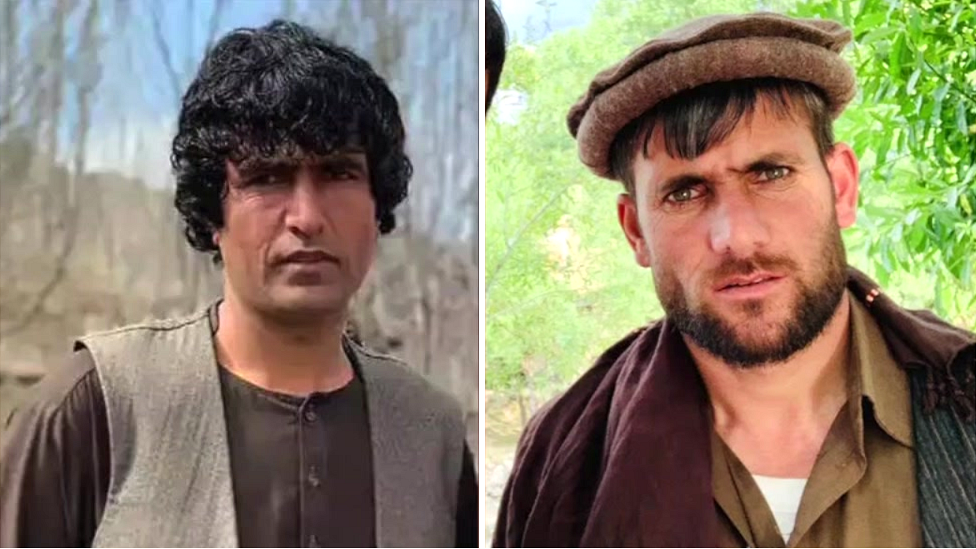
Abdul Hashim (left) and Noorullah, said to have been detained and killed by the Taliban
He shared photographs of Abdul Hashim's body and said his brother-in-law, Noorullah, had also been killed in the incident.
"They didn't let men attend Abdul Hashim's funeral," he told the BBC. "Only women were allowed to bury him."
One resident, who was also detained alongside the men by the Taliban during the search operation following the ambush, told the BBC around 20 men had been taken away from their village by the Taliban towards the location of the ambush, where they were beaten on their legs with metal cables and sticks.
"They put me in the back of one pick-up truck, someone pushed our heads down… Noorullah and Abdul Hashim were in another truck - they took them down and behind a Humvee and shot them by a small stream," he said.
Two other men from the same village were also killed that day.
There are other worrying allegations. A group of four men, travelling towards Tagharak village, a hotspot of resistance activity, were stopped and questioned by the Taliban in June, then allegedly killed.


Last year, shortly after the Taliban takeover of Kabul in August, resistance fighters in Andarab said they had briefly "liberated" a number of districts.
After they were recaptured by the Taliban, a doctor named Zainuddin was murdered at his home along with five of his relatives including young children. A relative alleged he had been killed for having provided treatment to resistance fighters.
"As a doctor, it was his duty to treat everyone," said the relative angrily.
In February this year another doctor, Dr Khorami, from Deh Salah district, was also killed. A relative alleged he had previously received threats from the Taliban warning him to stop treating those linked to the resistance.
Locals said a third doctor remained in custody, whilst a number of families accused of having links to the resistance said they had been told to leave their villages.
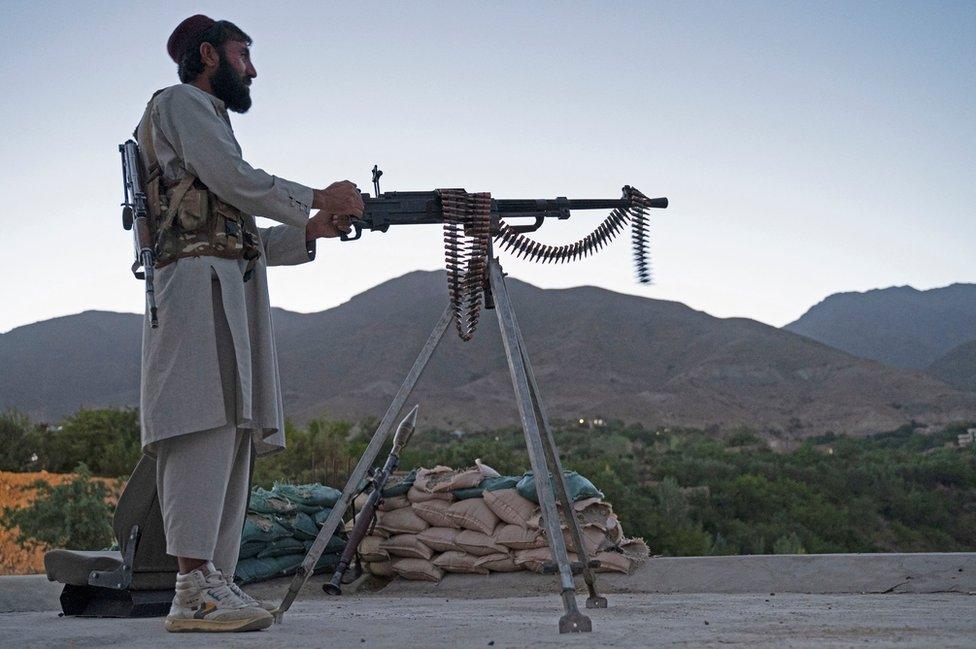
The Taliban's control of Andarab and Panjshir is not at present threatened - but their fighters have come under attack
The Taliban's head of information in Baghlan province, where Andarab is situated, Asadullah Hashimi, rejected the allegations.
A doctor had been killed in the area, he admitted, but he ascribed the incident to "personal enmity".
As for the allegations of extra-judicial killings, Mr Hashimi was categorical in denying any detainee had been killed, though he added, if anyone "violently resists government forces" during an operation they could be killed or arrested.
"That happens everywhere in the world."
Mr Hashimi refused to recognise the presence of resistance forces in the region, instead referring to a small number of "terrorists", but the area has a long history of opposition to the Taliban.
Both Andarab and Panjshir are dominated by the Persian-speaking Tajik community, whereas the Taliban are predominantly Pashtun.
The Taliban have managed to successfully recruit some locals into their ranks, unlike their previous regime in the 1990s. A number of local Taliban intelligence and police chiefs are Tajik or Persian-speaking, as are some of the soldiers stationed in Andarab.
Most others, however, are Pashtun. Many in Andarab worked in the security forces of the previous Afghan government and now strongly oppose the Taliban, regarding them as outsiders.
Some of the relatives of the victims of extra-judicial killings, however, also criticised the resistance forces, saying their guerrilla tactics left the civilian population vulnerable to Taliban reprisals.
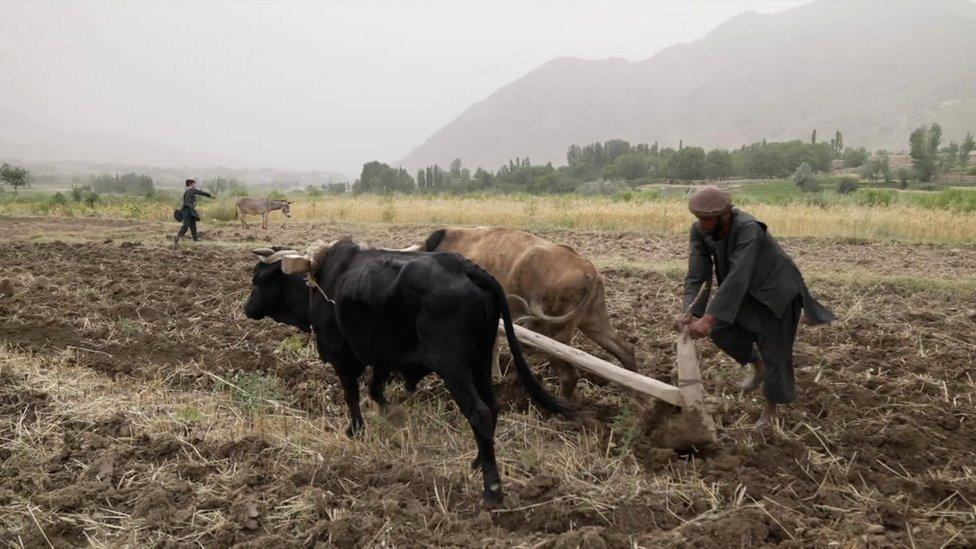
Residents of Andarab and Panjshir can find themselves caught between resistance fighters and the Taliban
The BBC managed to establish contact with one senior resistance fighter in Andarab, Commander Shuja.
In a pre-recorded message, responding to questions sent to him, he told the BBC: "Our fight is for justice, for brotherhood, equality and for the real Islam, not the Islam of the Taliban - which defames the religion…
"Our fight is for the rights of our sisters. The Prophet Muhammad said education is compulsory for both men and women."
The violence in Andarab and Panjshir is localised and does not yet represent a serious threat to the Taliban's overall control of the country, but they look to be at risk of repeating some of the same mistakes as their old opponents.
Over the past two decades, intrusive raids and allegations of the killing of innocent civilians by Afghan and international forces helped fuel the Taliban's popularity in parts of the country where they already had a presence and a degree of support.
Now, they are accused of using those same counter-insurgency tactics, whilst there appears to be little sense of accountability.
Speaking angrily, the relative of Abdul Hashim, who was allegedly detained and killed by the Taliban, told the BBC: "The Taliban claim to be a government, so they should investigate someone, not just kill them straight away."
Related topics
- Published16 May 2022
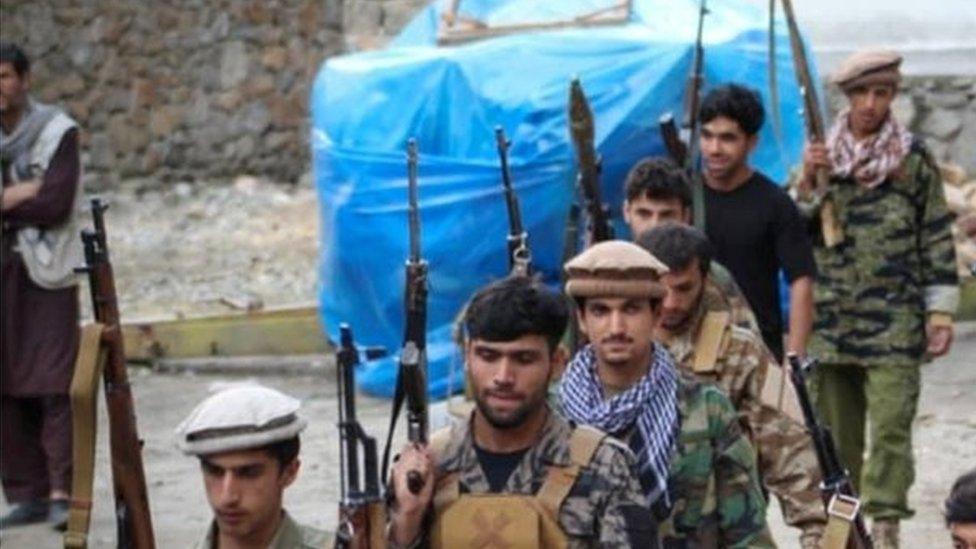
- Published7 May 2022
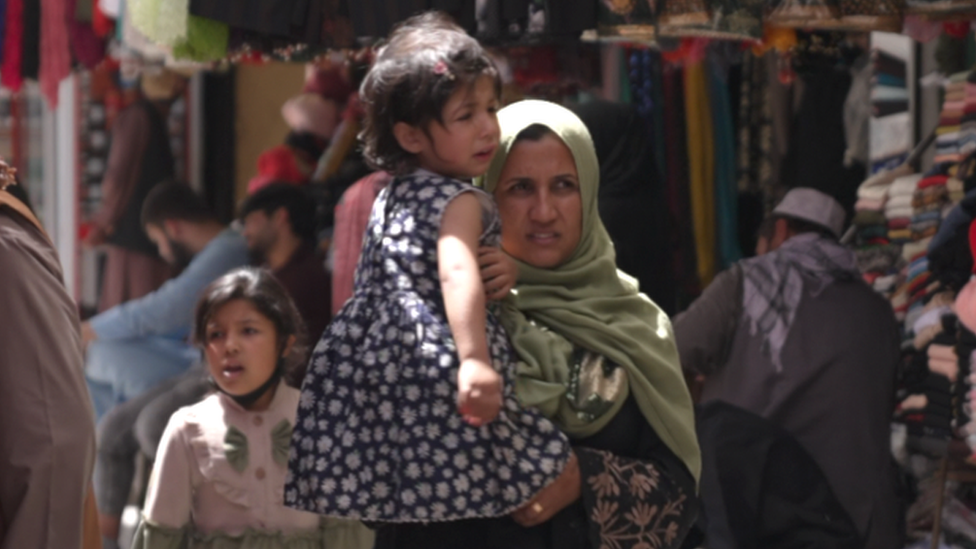
- Published13 September 2021
